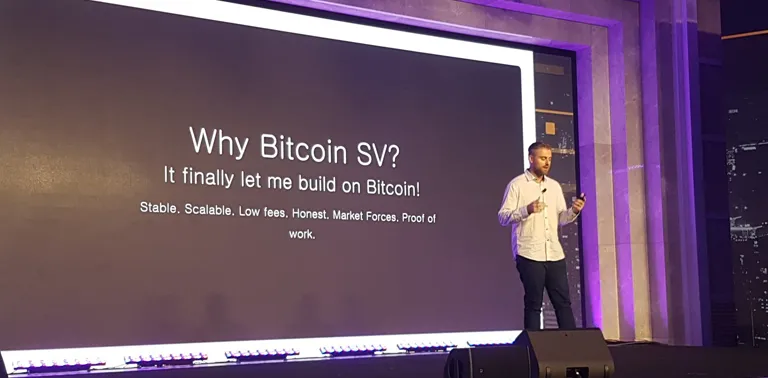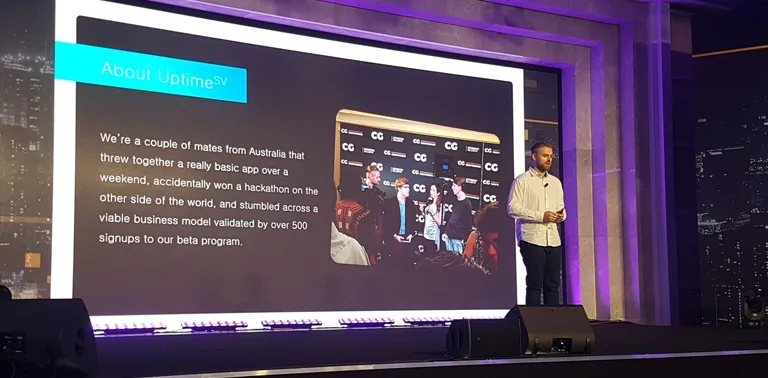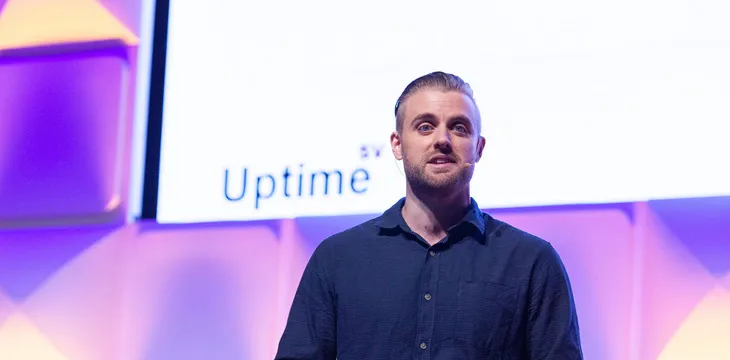|
Getting your Trinity Audio player ready...
|
UptimeSV, the winners of the first Bitcoin Association hackathon, have been hard at work to make their project a real business. Dean Little, Lead Developer of the company, took the stage at CoinGeek Seoul to discuss some of the technology they’ve had to develop to realize their goal, and announce a release date for an upcoming private beta.
He began his presentation by reiterating why the team chose to build on Bitcoin SV (BSV), and the answer was very much in line with Bitcoin Association Founding President Jimmy Nguyen’s call to action: he wanted something he could build on. BSV fit that role because it’s as stable protocol that can scale, along with several other reasons.

Then to remind the crowd what UptimeSV is all about, he gave a summary of the app’s goals. It aspires to help businesses by providing distributed performance and uptime monitoring for dedicated denial of service (DDoS) enterprise systems. Ultimately, it hopes to stop attacks from bad actors thwart attacks, and pay other users in BSV to help in that role as nodes for an UptimeSV network.
To build that technology, UptimeSV has had a few hurdles, and had to handle a few of them by innovating in new ways. The first hurdles was the multiple address formats of BSV; a problem solved by Polynym, which helps convert them all to the same format.

He also discussed spam, but discarded it as a problem from “useful idiots.” Spammers think they are causing problems, but in reality, they are paying miners to make the network better. But other types of spam, particularly using OP_Return, can still be problematic.
But to help network traffic more smoothly, Little revealed Unplanaria. Advertised as a BIP270 for apps, it allows wallets to create transactions to be sent directly to a business, which the business can then take data from directly without needing to scan the blockchain. It’s very much like peer to peer cash, but for data. As Little explains with a Twetch scenario:
So someone’s posted a Twetch without paying, we put it on our site, someone likes it, that data has been valued, we can put the two and two together, boom! We can publish that to the blockchain to pay for that Twetch being published. So the user wouldn’t even have to have Bitcoin to get into Bitcoin, right?
He also noted that UTXO Management, with potentially millions of transactions to post to a blockchain at once in rapid succession, causes a couple of problems with the existing technology. “The problem with a lot of the stuff that we’re doing now is we’re using things like BitIndex, wonderful services like this, but we’re having to send like an HTTP request each time.”
To solve that problem, Little and his team have created Datapush, a new tool to publish huge amounts to the blockchain really quickly. Using a single unique top up address where BSV is sent to, generates UTXOS and chains them. This will allow more efficient transaction creation, and “write a lot of data really quick.”
Both Datapush and Unplanaria will be published shortly, Little promises, so watch their Github space for more updates.
To end the presentation, Little showed off the design of UptimeSV and some of its features, including multi-lingual support. The big question that Little had to answer was when this app will be available. “We’re aiming for a October 30 private beta release, so end of this month. If you would like to be a part of the other 500 people who have signed up, please go to UptimeSV.com and register your interest there.”

 07-06-2025
07-06-2025 





